Chinese Hospitality in Changchun
“Do you have a hotel?” our now-ex-landlord asks, as her husband, Xiao Feng, chauffeurs us 45 minutes across town to the brand spanking new Harbin West station.
Their three-year-old son is on her lap, playing a literacy game on her phone, effortlessly picking out the correct name for “lorry”, “train”, “bus” and a whole series of animals.
Yep. A middle-class Chinese three-year-old is far more literate in Chinese than I am, after actively studying the language.
“Err, no,” I say. “But there are loads of hotels in Changchun, and I have a book…”
The concept of independent travel, let alone independent international travel, is pretty alien to the overwhelming majority of mainland Chinese, and our landlords are no exception. Further, as a single mother, I’m a rarity in China. So, as foreign guests and a single parent family, we are doubly to be looked after.
“Do you know anyone in Changchun?”
I should probably have lied, but I don’t. She retrieves her phone and makes some calls.
“You must call my friend Dongchao,” she says. “He lives in Changchun. He’ll help you find the Manchukuo Palace…”
“This really isn’t necessary….” I begin.
But they’re having none of it. Like it or not, Dongchao will be looking after us. “He’ll collect you from the station,” she says. “Call him as soon as you know what train you’re on.”
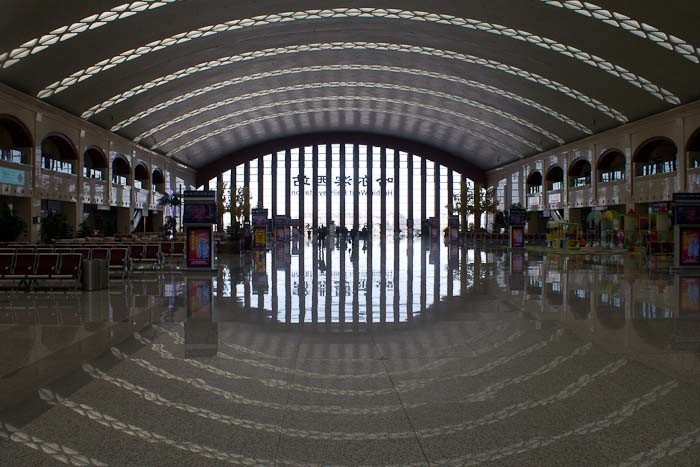
We’re headed to Changchun because it’s on our way to Mongolia and, as it’s home to the palace where PuYi, China’s last emperor, ruled as a puppet of the Japanese from 1932 until the end of World War II, it would be silly not to stop off there.
Ever since watching The Last Emperor, Bertolucci’s classic, I’ve had a minor obsession with PuYi, whose life story – from infant emperor through to Japanese puppet, from Soviet captivity to reeducation and finally rehabilitation as a gardener in Beijing – is an absolute epic.
I’ve barely bought our train tickets when Dongchao calls me.
He’ll collect us.
“No, no,” I say. “We don’t need collecting!”
Apart from anything else, Changchun isn’t the kind of place that necessarily merits a night, so if there are tickets on the night train to our next stop, Xanadu, I’ll be buying them on arrival. And I don’t want poor Dongchao waiting around while we do this.
Nor, however, do I want to have to spend the night in Changchun unless I have to.
Zac is more sanguine. “What’s wrong with Changchun?” he says. “WHY can’t we spend the night there?”
“It’s the capital of China’s car industry,” I say.
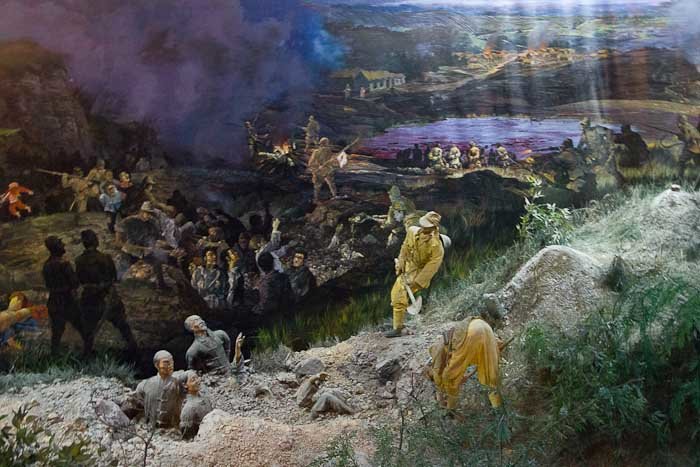
“Changchun,” Dongchao remarks. “Is very….”
He struggles for the word. “Polluted?” I suggest.
The sky was bright sunny blue when we left Harbin. A couple of hours and several hundred kilometres later, it’s a dirty grey, thick with dust and an eyetingling waft of burning rubber, the skyline Bladerunner-dense with factory chimneys.
Like Harbin West station, Changchun West has been positioned outside the main body of the city, so that suburbs can grow up around it, which they are duly doing in a miasma of cranes and concrete.
“Yes.” Dongchao majored in English, but he hasn’t used the language since graduating seven years ago, so he’s a little rusty. I sound the new word out for him with exaggerated lip movements, and spell it for him as well. “P.O.L.L.U.T.E.D.”
In the full tradition of Chinese hospitality, Dongchao has not only given up his one day off a week to look after us but enlisted a friend, with a car, to chauffeur us around.
And when I say Chinese hospitality, I do mean Chinese hospitality, something that is, in my experience, especially prevalent up here in the north-east, where non-Chinese are few and far between.
They take us to the slow train station to buy tickets on the sleeper – we’ll need to take tomorrow’s train, as there are no beds available – and I have to virtually body-check Dongchao to stop him buying them for us.
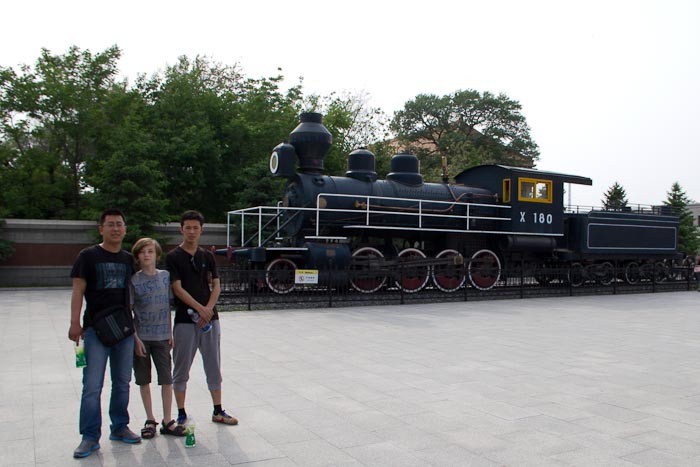
It takes us a good couple of hours to navigate the construction-choked centre and winding alleys of Changchun – more and more Chinese are buying cars, now, but stalls still spill into the narrow streets as they did in the days of bicycles – to reach what we persist in calling “PuYi’s Palace” but is, in fact, the “Museum of the Imperial Palace of the Manchu Puppet State”.
Dongchao literally races me to the ticket desk. “No, really, please,” I say, pathetically. “I’d like to invite you. Please at least let me invite you to dinner…”
No dice. He’s paying for us. And he buys us a book in the giftshop, PuYi’s eminently readable memoir.
In fact, Dongchao makes a most excellent guide. As Zac and I marvel at a “timber-fuelled” steam train, positioned outside the palace proper, wondering why we never had them in Britain, Dongchao steps in and we figure out that it’s actually coal-powered.
He knows the names of the key figures of the Manchu state, can translate signage, and, as we wander around the museum that accompanies the palace proper, we learn ever more about the era that produced the medical experiments of Unit 731 in Harbin.
There is, in fact, only one awkward moment, when I use the victory of the Vietnamese in the Vietnam War to explain the term “guerilla”, entirely forgetting that China had had its own Vietnam War….
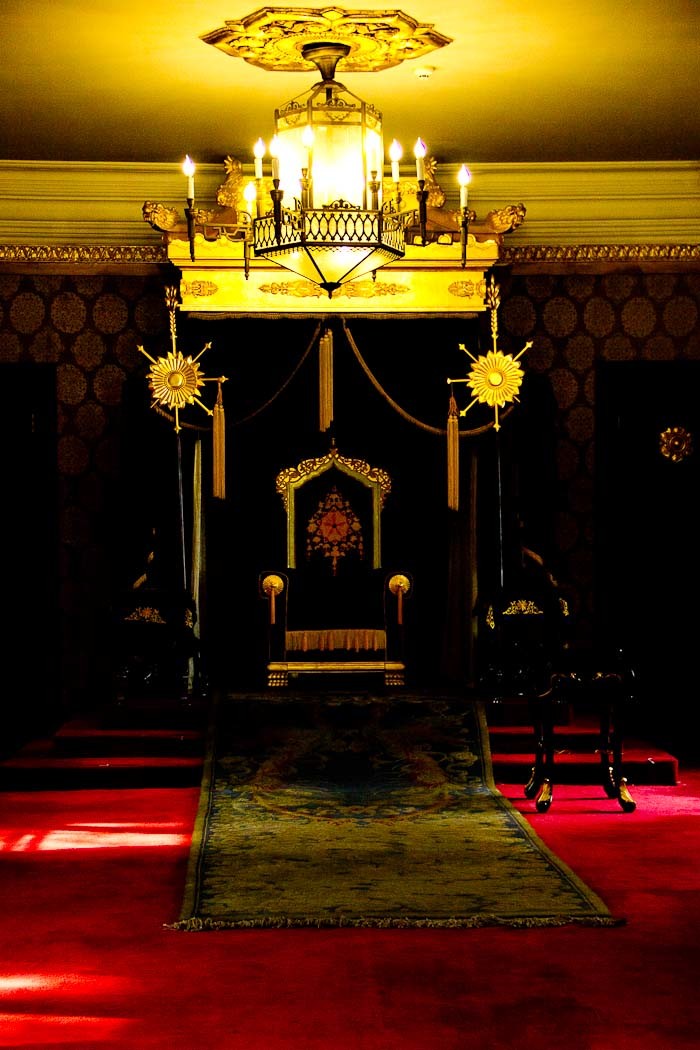
And then we explore the palace, a surprisingly modern, unfussy, Western-influenced affair, which I find oddly moving.
They invite us to dinner. Do we eat Chuancai (Sichuan food)? We do.
Please, please, please can I invite them?
No. We are guests.
They treat us to mountains upon mountains of Sichuan food – fish hot pot, razor clams, squid, fruit – in an upscale Sichuan joint. And we talk about happiness, about Chinese school, about Changchun, and change, and travel…
People in China, Dongchao explains, are less concerned with short-term happiness and more concerned with doing the right thing for generations past and future, and the sense of contentment that comes with knowing that you have done so.
Which is why they can work such long hours, as adults and as children.
And then they take us to the hotel we’ve picked out from the guidebook, and recommend activities for tomorrow. It’s actually been a lovely, lovely day.
I say, rather feebly, that if Dongchao ever makes it out to Europe or to Indonesia, when we are there, we’ll return the favour. As for the overwhelming majority of Chinese, though, international travel is currently beyond his ken.
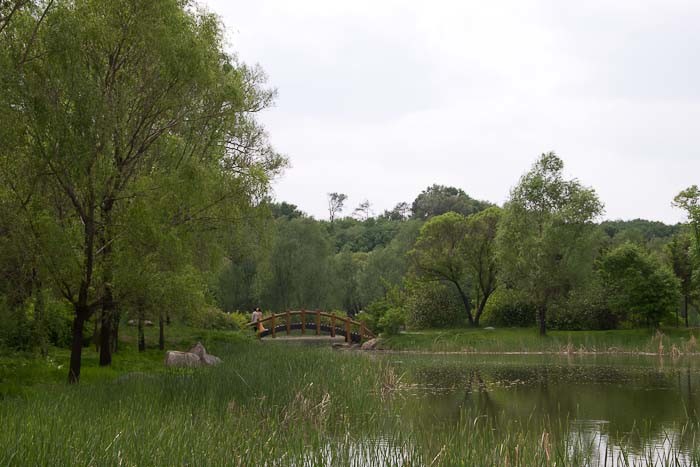
The next morning, we dump our bags at the station, and spend the day riding bikes around Jingyuetan, a lakeside park a few stops out of town on the metro, where I add to my collection of photos of Chinese brides and grooms. It’s really rather splendid.
Dongchao’s hospitality, in fact, has transformed Changchun for us.
As we settle down and arrange our stuff around our bunks, Zac appears surgically attached to PuYi’s memoir.
I’m working on The Travels of Marco Polo. It is – and I enjoyed both Ulysses and War and Peace, and managed a few inches of Proust – not the easiest of reads.
But we ARE headed to Xanadu, after all…

I am so excited about my coming visit to china. Your writing just ups it a few hundred notches. thanks so much.
Yay!
Hi Theo,
Do you sell your images on line?
I have a LOT of images going well back a few years, and have decided to try and sell them on-line.
I have looked at Alamy as possibly the best site. If you do sell them on line, which site do you use? Or any usggestions.
Secondly – and again IF you sell them on-line. Which programme do you use to watermark them?
Your input would be brilliant. At present I am stuttering around in a haze as to which way to go on both the above.
Take care both of you
Wobbling Rob
I don’t sell online. I made a stab at istock back when my photography was less good than it is now, and now I’m aware enough of things like lighting compensation to think that I’m not at the level when I could sell on Alamy, which, you are correct, is where I understand the money to be. I know a pro photog in the UK who sells a lot on them.
My impression is the things that make money there are lifestyle-y rather than travel-ly, but i could be wrong. You should deffo give it a go though — let me know how you get on.
AFAIK, Alamy watermarks everything for you, so I would STRONGLY avoid watermarking them.
Do you know Peter West Carey? He might be a good guy to ask…
Hello! I have a weekly internet radio show and am doing a series on travelling un/homeschoolers later in July/August. I have spoken to Lainie and Miro recently and found you on her site. Would you be interested in pre-recording a conversation with me at a convenient time for us both? I am in London. Let me know and I’ll send you more via email!
Vivienne
Hi Viv — yeah, sure, I’d be up for that. We’re in London at some point this week, so prob best to arrange it when we’re in the same timezone. I’ll ping you an email with my deets… Theodora
Beautifully written account. One of the most vivid travel articles I’ve read in a long time, in fact. I especially like the expression “Bladerunner-dense.” Hit me right on the nerdybone and just kept tingling.
I’ve been living in Taiwan (the illegitimate offspring of China)and I have experienced this kind of hospitality first-hand. The Taiwanese do the same thing. Lead you around, having fun, paying for everything and translating. It makes the experience truly awesome, even after living here for eight years.
Thanks so much for the post!
Thanks, Daniel. I think it’s such a shame that most people’s first encounter with the Chinese can be — at least on the mainland — the scammers who work tourists in Beijing and Shanghai…